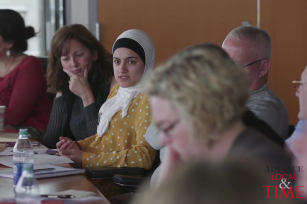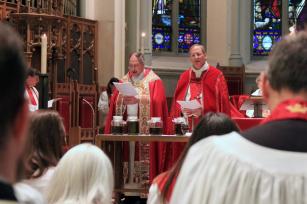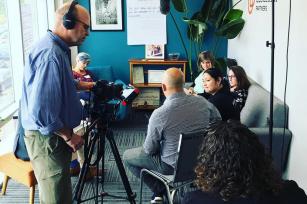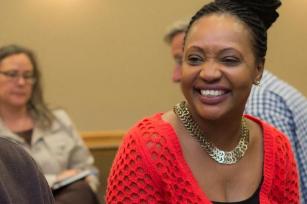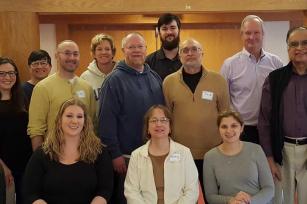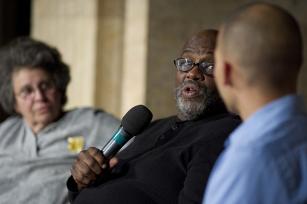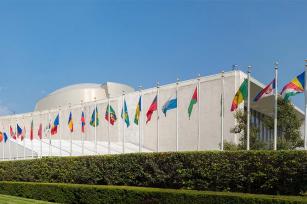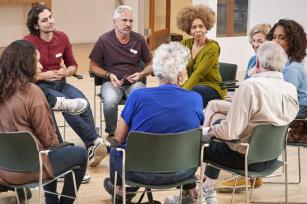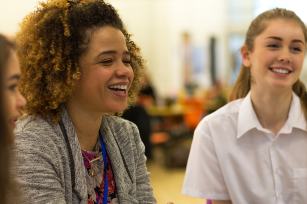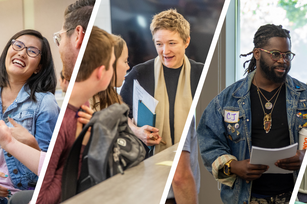
Breadcrumb
- Essential Partners
- Our Impact
- Impact Stories
- Abortion Dialogues in Greater Boston
Abortion Dialogues in Greater Boston
The idea for the Public Conversations Project—the organization that, in 2016, became known as Essential Partners—occurred to Laura R. Chasin while watching a televised debate on abortion.
The moderator’s efforts to facilitate an orderly conversation among two pro-choice and two pro-life advocates had been totally ineffective. Speakers on each side had attacked and counter-attacked, and they had interrupted each other repeatedly to disparage their adversaries. The moderator lamented, “There's nothing going on here but a lot of noise.”
Laura agreed. She mused that she and many of her family therapy colleagues knew how to facilitate constructive exchanges on “hot” conflicts—at least among related individuals. Could they also help people engage in productive conversations about abortion and other divisive public issues?
Laura invited a small group of colleagues at the Family Institute of Cambridge to join her in exploring this possibility. In the Spring of 1990, the founders convened small dialogue groups to talk about abortion. These early participants served as collaborators, innovating methods and structures to allow constructive conversations about the polarizing issue.
Within eighteen months, they had conducted 18 single-session dialogues. Several participants were activists but, by design, only two were highly visible leaders. Each of the dialogue groups were evenly balanced with people who described themselves as "pro-choice" or "pro-life."
By the end of this series of dialogues, the founders had developed and field-tested a model for reducing polarization, building trust and mutual understanding across deep divides, and making new relationships possible without sacrificing strongly-held values.
Tragedy and Transformation
Then on December 30, 1994, an activist named John Salvi entered two women’s health clinics in Brookline, MA with a gun and opened fire. He murdered two clinic workers and wounded several others. The tragedy drew widespread media attention. Governor Weld and Cardinal Law issued a joint call for common ground talks between activists and an end to inflammatory rhetoric.
At that time, Essential Partners (then the Public Conversations Project) was the only organization with a track record of promoting new kinds of conversations on the issue of abortion. The founders had maintained good relationships with the sixty participants of their 1990-92 abortion dialogues.
That work gave EP considerable access to, and credibility with, activist networks on both sides of the issue. Well positioned to build on the fruits of our prior efforts, EP's founders initiated five streams of activity in the following months:
- A second series of introductory abortion dialogues
- A training program for pro-choice and pro-life facilitation teams
- An ongoing network for "graduates" of the introductory dialogues interested in opportunities for sustained dialogue and collaboration
- A more limited confidential dialogue series involving pro-choice and pro-life activists
- The dialogue handbook, Fostering Dialogue Across Divides
Pro-Life and Pro-Choice Leaders Meet in Secret
Meanwhile, another confidential dialogue experiment was underway.
Working in partnership with mediator Susan Podziba, EP co-founder Laura R. Chasin designed, convened, and facilitated a series of confidential dialogues between three pro-choice and three pro-life leaders:
- Rev. Anne Fowler, an Episcopal priest and outspoken pro-choice advocate who served as the Rector of St. John's Church in Jamaica Plain, MA
- Madeline McComish, a chemist and then-president of Massachusetts Citizens for Life
- Nicki Nichols Gamble, then-President of Planned Parenthood League of Massachusetts
- Barbara Thorp, the director of the Catholic Archdiocese Pro-Life Office in Massachusetts
- Melissa Kogut, the Executive Director of NARAL Pro-Choice Mass
- Frances X. Hogan, an accomplished legal professional who served in leadership roles for numerous pro-life and Catholic organizations, including Women Affirming Life and the Pro-Life Committee of the National Conference of Catholic Bishops
These dialogues were never intended to change minds. Their intent was to broaden perspectives, deepen understanding, and foster human connections. “The dialogues changed my life,” says Gamble. “It was a miracle,” says McComish.
In the end, the participants co-authored an account of their experience that was published as "Talking with the Enemy" in the January 29, 2001 edition of the Boston Sunday Globe.
The Basement Talks: A Documentary for a Post-Roe America
Following the Supreme Court ruling that effectively overturned Roe v. Wade, a documentary was released that told the story of the six women who participated in these confidential dialogues.
The Basement Talks, produced by independent filmmakers Josh Sabey and Sarah Perkins, offers insight into the context and stakes of the dialogues—and the impact they had on the course of the abortion conflict in Massachusetts.
Dialogue participant Melissa Kogut, former head of NARAL Pro-Choice Massachusetts, calls this “a powerful documentary right when we need it.” Frances Hogan, founder of Women Affirming Life describes it as “fair, clear and intriguing,” and Anne Fowler, a pro-choice Episcopal priest, writes “inspiring, brilliantly told.”
The Ongoing Mission of Essential Partners
Over the years, the Essential Partners dialogue method developed and changed. Practitioners discovered applications to a broad range of divisive public issues, in a diverse array of communities and organizations, with people from every walk of life. But the underlying mission has remained steadfast.
Essential Partners gives people the means to strengthen relationships, deepen belonging, and renew hope in their communities. EP has helped people have richer conversations about abortion—as well as issues like partisan polarization, race, gender, sexuality, the environment, interfaith conflict, and more.
The ability to live, learn, and work with people who are different is fundamental to a peaceful society and a flourishing democracy. EP's approach, Reflective Structured Dialogue, engenders trust without compromising values, builds connections that make communities resilient, and fosters a deep sense of belonging for all.
Essential Partners continues the mission of Public Conversations Project today by fostering constructive dialogue where conflicts are driven by differences in identity, beliefs, and values.
Related Impact Stories
Testimonials

Program ParticipantBefore, I thought all dialogue that does not culminate in solution was considered equivalent to failure. Now I see that dialogue is a stage complete in itself.
Burundi

Program ParticipantI did not anticipate having as many concrete takeaways as I do. I feel there is an immense practical application.

Paul Schupe, Hancock United Church of ChristIt’s amazing how closely we can work together on certain projects and never know what about our faith motivates our work. This work deepened my appreciation for everyone who was there; hearing everyone's stories helped me to appreciate them more and the depth of their convictions, even when they’re convictions I don’t share.
Lexington, Massachusetts

Seth Karamage, MediatorI am amazed at what came out—the way people shared their stories. This is not like a role-play; it really touched me.
Interfaith Mediation Centre, Nigeria

Romeo McCauley, Project PartnerI learned that I can build relationships, that I can be connected to anybody who I want to be connected to, no matter how difficult it is
Liberia

Sepi Djavaheri, Community Mobilizers Director“The Essential Partners training has had a multiplier effect—not only did it enrich the Dialogue Across Faiths event itself, but it also equipped a cadre of local leaders with effective tools to lead ongoing, constructive conversations within and between their congregations.”
UJA-Federation of New York

Undergraduate StudentI have never heard people talk so openly about race, especially in a class setting. Everyone was respectful and honest at the same time. The dialogue structure helped me learn about my peers and helped me feel more comfortable than I ever have about discussing controversial issues.
Gordon College, Massachusetts

Kim Davidson, OmbudsI’ve gained not only confidence but tools. The Essential Partners training was worth every penny.
Oberlin College, Ohio

Misty Stoll, School Board TrusteeThe Sheridan Community has changed in the best way since the Essential Partners training. The Center for a Vital Community has been holding monthly dialogues. I’m going to facilitate the upcoming one. What’s great is that we’re attracting a much more diverse group of participants. There are always the regulars who come, but now we’re also getting conservative Republicans to come as well—politicians come, even the Sheriff comes.
Wyoming

Program ParticipantThis is the best adult learning experience I have had in the past five years. I wanted to learn new skills—I did!

Linda Gryczan, MediatorInstead of demonizing and dehumanizing the other, we built a deeper connection. The fact that we disagree matters much less. It matters much more that we are neighbors in this community.
Montana Mediation Association

Nicki Glasser, Policy CoordinatorWhat surprised me was how much you could transform a relationship during a three-hour conversation.
Transformation Center, Massachusetts

Matthew Sandikie, Project PartnerThis has been quite different from other discussions in Liberia about peace. While many processes have been about how to reform ex-combatants, this was about how we may hold our own views but live together peacefully.
Liberia

Meirav Solomon ’20Dialogue not only teaches you how to interact and understand more deeply those around you, it also teaches you more about the world around you and yourself. I think dialogue is super important to my growth as a student, a global citizen and a human being. I have learned to listen, I have learned to speak out, I have learned how to access my stretch zone (where I feel uncomfortable speaking but not turned off) and I have learned where my limits are.
Cary Academy, NC

Program ParticipantI read this comment from the 14th Dalai Lama: "Every change of mind is first of all a change of heart.” It seems appropriate for what we are doing.
Bayview, Michigan

Rebekah Shrestha, SVPEssential Partners has played a catalytic role in our ability to facilitate dialogue time and time again, and we could not have done this work without them.
Belfer Center for Innovation & Social Impact and Office of Strategic Planning, 92NY

Kate CellThe thing that always feels like magic to me—and I’ve used it in several meetings that I’ve had since—is how the practitioners start by setting out pacts or agreements.
Union of Concerned Scientists, Massachusetts

Imam Sani IsahThrough this training, we will have more people in the stream of work that we do and become better equipped with the know-how, skills and techniques. But most important, together we will sow a seed that will germinate and become a source of the antidote to terrorism, fanaticism, bigotry and extremism.
Nigeria

Janele Nelson, Mission DirectorIn these divisive times, Essential Partners has given my local YMCA and now the national YMCA a means to build bridges through dialogue, re-establishing foundations for constructive change to occur.
YMCA of Pierce & Kitsap Counties (WA)

Kim Davidson, OmbudsI’ve gained not only confidence but tools. The Essential Partners training was worth every penny.
Oberlin College, Ohio

Lauren Cobb, Task Force MemberI now lead teams with a different language, using different processes, and with a different awareness of team dynamics. [I’ve seen] relationships grow and deepen, unity and commitment remain high, and mutual respect established and fostered.
Glendale Presbyterian Church, California

Gail AndersonWe became confident really early on that the model was working. We were nervous there would be yelling and blow-ups but after a few conversations we realized that wasn’t happening… People were treating each other humanely.
Minnesota Council of Churches

Program ParticipantI am now open to new views and can moderate my impulse to debate or persuade others of different views
Montana

Program ParticipantI felt an amazing sense of accomplishment when the Essential Partners training ended; that I'd done something important for my community and something important for me.
Massachusetts

Program ParticipantI read this comment from the 14th Dalai Lama: "Every change of mind is first of all a change of heart.” It seems appropriate for what we are doing.
Bayview, Michigan

Misty Stoll, School Board TrusteeI ran for my local school board in 2018 and was elected. I use the skills in our meetings, whether I’m chairing the meeting or not. This makes the meetings much more productive. We don’t go over the same topics over and over again.
Wyoming

Program ParticipantI did not anticipate having as many concrete takeaways as I do. I feel there is an immense practical application.

Anjali Bal, Associate Professor of MarketingOne of the things that we talked about was the ability to hear another person’s point of view, even if our minds aren’t changed. We have to remember that any sort of movement is movement. If we don’t acknowledge small movement, then we just stay on two different sides, and it’s all black and white, and we don’t hear each other.
Babson College, MA

Windor DorkoAs a former rebel, I really believe that if we had known about dialogue, perhaps we would not have had a civil war.
Liberia

Belle AbayaWhat is special about Essential Partners' approach is that it promotes authenticity, reduces defensiveness, increases curiosity, and boosts connectedness.
The Conflict Resolution Group Foundation, Philippines

Bob Bordone, Expert and AuthorEssential Partners does the best work in the field of dialogue and communication.
Harvard Negotiation & Mediation Clinical Program, Co-Founder

Megan DeFranzaThere is a need not only for safe space within our churches but for our church leaders who often feel alone, or who may feel their job could be at risk if they engage in controversial conversations. How are they to make safe spaces in their own congregations for healthy dialogue if they rarely experience safe space to do the same?
Gordon College, Massachusetts

Program ParticipantThere should be opportunities throughout the [Anglican] Communion for ongoing structured conversations regarding difficult issues. These should engage persons at all levels within and between Provinces and should be guided by agreed covenants similar to those that have assisted our conversations.
Anglican Community & Human Sexuality Retreat

Cricket Fuller, The Christian Science MonitorThis wasn’t a policy debate [about guns]. Instead, two people whose backgrounds and views diverged in almost every way possible shared a moment of honesty that struck at the heart of the matter.
Boston, Massachusetts

Belle AbayaAuthentic conversations will lead people to reflect on their own thinking and transform their perspectives to include that of others.
The Conflict Resolution Group Foundation, Philippines

Program ParticipantI am now open to new views and can moderate my impulse to debate or persuade others of different views
Montana

Program ParticipantThis is the best adult learning experience I have had in the past five years. I wanted to learn new skills—I did!

Etionette Nshirmirimana, Burundian Master TrainerI realized that by using the “dialogue” approach, people could talk of what is deep in their heart, especially things that have harmed them.
Burundi

Veronique Cavaillier, Director of Eastern Trade CouncilI think Essential Partners' training should be mandatory in every legislature. I think it should be a requirement.
The Council of State Governments

Program ParticipantThis is a different tool for engagement. It’s not about you, it’s about others. It involves the art of listening and sincerely talking from the heart
Interfaith Mediation Centre, Nigeria

Belle AbayaTogether, we married our ideas to create a dialogue model that took into consideration our young people’s particular needs, and our culture.
The Conflict Resolution Group Foundation, Philippines

Program ParticipantThis is a new idea, so many people speaking from their hearts. People can come together...if people can understand, they can change their hearts; then this can bring about more change.
Interfaith Mediation Centre, Nigeria

Megan DeFranzaHere safe space was created for pastors and church leaders to wrestle with topics like evolution which are all too often “off limits” or believed to be antagonistic to the faith.
Gordon College, Massachusetts

Bob Bordone, Expert and AuthorEssential Partners does the best work in the field of dialogue and communication.
Harvard Negotiation & Mediation Clinical Program, Co-Founder

Program ParticipantThis is a different tool for engagement. It’s not about you, it’s about others. It involves the art of listening and sincerely talking from the heart
Interfaith Mediation Centre, Nigeria

Member of the CongregationI cannot possibly walk out of this experience and help being a different person. I feel that my own experience has been life-changing.
Glendale Presbyterian, California

Janet Harris, Winthrop Rockefeller InstituteThe learning we received from Essential Partners has helped us open up space for people to have difficult conversations in a different way. The more we do this, the more we realize that dialogue has to be a part of all our work.
Arkansas

Program ParticipantThis is a new idea, so many people speaking from their hearts. People can come together...if people can understand, they can change their hearts; then this can bring about more change.
Interfaith Mediation Centre, Nigeria

Imam Sani IsahThrough this training, we will have more people in the stream of work that we do and become better equipped with the know-how, skills and techniques. But most important, together we will sow a seed that will germinate and become a source of the antidote to terrorism, fanaticism, bigotry and extremism.
Nigeria

Peter Cooke, Immigration Dialogue ParticipantThere’s a real difference to people who are coming to meetings. They say, wow this is so different. They all said how people were more on the ball, more congenial. Now people see growing the economy as a way to unify the receiving community and immigrant communities.
New Hampshire

Linda Gryczan, MediatorInstead of demonizing and dehumanizing the other, we built a deeper connection. The fact that we disagree matters much less. It matters much more that we are neighbors in this community.
Montana Mediation Association

Program ParticipantThe highlight for me was the interconnectedness of the participants’ views, mutual respect, and range of experiences within the group
Montana

Andrew Wulf, PrincipalThe community dialogue was instrumental in helping us create a new policy around class rank. Though a controversial topic in the community, the dialogue EP helped us run ensured all voices were heard and valued. Regardless of how people felt with the final result, one parent summed it up best for us, ‘sometimes the process is more important than the outcome’.
Newburyport High School

Nicki Glasser, Policy CoordinatorWhat surprised me was how much you could transform a relationship during a three-hour conversation.
Transformation Center, Massachusetts

Bill Scott, Project DirectorThere was a remarkable change in the way we were able to communicate with one another following the facilitated conversations.
Massachusetts Department of Mental Health

Synagogue Congregant“After Octover 7th, I used the Essential Partners Guide to Dialogues About Israel and Palestine to design the dialogue and develop prompts. I deployed the training I received from Essential Partners to lead a Reflective Structured Dialogue where participants could share stories, encourage curiosity, and approach one another with tenderness. … The dialogue programs at our synagogue were a resounding success. Members still hold very different perspectives, but those who disagree, even vehemently, have been able to maintain relationships. Those whose views fall between the extremes feel more able to share their perspectives. They see one another as members of a shared community once again.”

Seth Karamage, MediatorI am amazed at what came out—the way people shared their stories. This is not like a role-play; it really touched me.
Interfaith Mediation Centre, Nigeria

Janele Nelson, Mission DirectorIn these divisive times, Essential Partners has given my local YMCA and now the national YMCA a means to build bridges through dialogue, re-establishing foundations for constructive change to occur.
YMCA of Pierce & Kitsap Counties (WA)

Undergraduate StudentI notice that my classmates take much more care when speaking about people who practice other religions. They make fewer assumptions, and they’re more careful with their words to make sure to avoid unintentional connotations.
Bridgewater College, Virginia
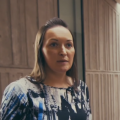
Louise O’Kane, Community Places[Essential Partners’] technique is used to explore contentious or divisive issues. So looking at renewable energy we thought this was an ideal opportunity to explore all the complexities of that issue. I found it a really useful method, and although this is the first time we’ve used it I am sure we’ll be using it again.
Northern Ireland, UK

Cricket Fuller, The Christian Science MonitorThis wasn’t a policy debate [about guns]. Instead, two people whose backgrounds and views diverged in almost every way possible shared a moment of honesty that struck at the heart of the matter.
Boston, Massachusetts

Douglas Stone, Sheila Heen, and Bruce PattonWe owe a debt of gratitude to Laura Chasin and her collaborators at Essential Partners… From them, we have learned about the transformative power of telling one’s story and speaking to the heart of the matter.
Difficult Conversations

Program ParticipantThe highlight for me was the interconnectedness of the participants’ views, mutual respect, and range of experiences within the group
Montana

Rebekah Shrestha, SVPEssential Partners has played a catalytic role in our ability to facilitate dialogue time and time again, and we could not have done this work without them.
Belfer Center for Innovation & Social Impact and Office of Strategic Planning, 92NY

Program ParticipantWhile our differences remain, the relationships between us have been strengthened and deepened. We have gained in mutual respect, affection, and appreciation of one another as followers of Jesus and fellow-bishops.
Anglican Community & Human Sexuality Retreat

Program ParticipantI felt an amazing sense of accomplishment when the Essential Partners training ended; that I'd done something important for my community and something important for me.
Massachusetts

Undergraduate StudentI notice that my classmates take much more care when speaking about people who practice other religions. They make fewer assumptions, and they’re more careful with their words to make sure to avoid unintentional connotations.
Bridgewater College, Virginia
